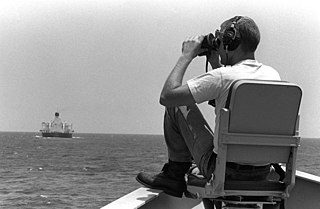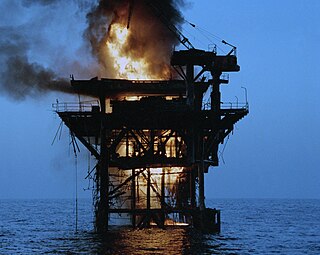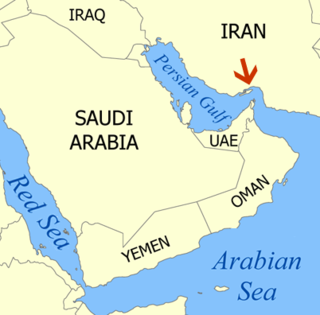 W
WOn January 12, 2016, two United States Navy riverine command boats were seized by Iran's Islamic Revolutionary Guard Corps (IRGC) Navy after they entered Iranian territorial waters near Iran's Farsi Island in the Persian Gulf. Initially, the U.S. military claimed the sailors inadvertently entered Iranian waters owing to mechanical failure, but it was later reported that they entered Iranian waters because of navigational errors. The U.S. secretary of state, John Kerry, called the Iranian foreign minister Mohammad Javad Zarif within five minutes. His call was followed by multiple other phone calls between the two ministers. The sailors had a brief verbal exchange with the Iranian military and were released, unharmed, 15 hours later.
 W
WOn June 20, 2019, Iran's Islamic Revolutionary Guard Corps's (IRGC) shot down a United States RQ-4A Global Hawk BAMS-D surveillance drone with a surface-to-air missile over the Strait of Hormuz. Iranian officials said that the drone violated their airspace, while U.S. officials responded that the drone was in international airspace. Both Iran and the U.S. differ on where the incident actually occurred.
 W
WThe 2019–2020 Persian Gulf crisis is an intensification of military tensions between the Islamic Republic of Iran and their allies and the United States of America and their allies in the Persian Gulf region. The U.S. began a buildup of its military presence in the region to deter an alleged planned campaign by Iran and its non-state allies to attack American forces and interests in the Persian Gulf and Iraq. This followed a rise in political tensions between the two countries during the Trump administration, which included the withdrawal of the U.S. from the Joint Comprehensive Plan of Action (JCPOA), the imposition of new sanctions against Iran, and the designation of the Islamic Revolutionary Guard Corps (IRGC) as a terrorist organization. In response, Iran designated the United States Central Command as a terrorist organization.
 W
WOperation Eagle Claw, known as Operation Tabas in Iran, was a United States Armed Forces operation ordered by U.S. President Jimmy Carter to attempt to end the Iran hostage crisis by rescuing 52 embassy staff held captive at the Embassy of the United States, Tehran on 24 April 1980.
 W
WOperation Earnest Will was the American military protection of Kuwaiti-owned tankers from Iranian attacks in 1987 and 1988, three years into the Tanker War phase of the Iran–Iraq War. It was the largest naval convoy operation since World War II.
 W
WThe International Maritime Security Construct (IMSC) is a consortium of countries officially tasked with maintaining order and security in the Persian Gulf, Gulf of Oman, Gulf of Aden and Southern Red Sea, particularly regarding maritime security of global oil supply routes. It was formed on 16 September 2019 in Bahrain, by the United Kingdom, Australia, Albania, Saudi Arabia, Bahrain, Lithuania, the United Arab Emirates, and the United States. The operational arm of the IMSC is Coalition Task Force SENTINEL.
 W
WOn 5 December 2011, an American Lockheed Martin RQ-170 Sentinel unmanned aerial vehicle (UAV) was captured by Iranian forces near the city of Kashmar in northeastern Iran. The Iranian government announced that the UAV was brought down by its cyberwarfare unit which commandeered the aircraft and safely landed it, after initial reports from Western news sources disputedly claimed that it had been "shot down". The United States government initially denied the claims but later President Obama acknowledged that the downed aircraft was a US drone. Iran filed a complaint to the UN over the airspace violation. Obama asked Iran to return the drone. Iran is said to have produced drones based on the captured RQ-170.
 W
WOn 13 June 2019, two oil tankers were attacked near the Strait of Hormuz while they transited the Gulf of Oman. The Kokuka Courageous, flagged in Panama and operated by a company based in Japan, and Front Altair, flagged in Marshall Islands and operated by a company based in Norway, were attacked, allegedly with limpet mines or flying objects, sustaining fire damage. American and Iranian military personnel responded and rescued crew members. The attacks took place a month after the similar May 2019 Gulf of Oman incident and on the same day the Supreme Leader of Iran Ali Khamenei met with Japanese Prime Minister Shinzō Abe in Iran. Abe was acting as an intermediary between American President Donald Trump and Iranian supreme leader, Ali Khamenei.
 W
WOperation Nimble Archer was the 19 October 1987 attack on two Iranian oil platforms in the Persian Gulf by United States Navy forces. The attack was a response to Iran's missile attack three days earlier on MV Sea Isle City, a reflagged Kuwaiti oil tanker at anchor off Kuwait. The action occurred during Operation Earnest Will, the effort to protect Kuwaiti shipping amid the Iran–Iraq War.
 W
WOperation Prime Chance was a United States Special Operations Command operation intended to protect U.S.-flagged oil tankers from Iranian attack during the Iran–Iraq War. The operation took place roughly at the same time as Operation Earnest Will, the largely naval effort to escort the tankers through the Persian Gulf. The operation was begun after the mining of the U.S.-flagged Kuwaiti oil tanker Bridgeton.
 W
WIranian frigate Sahand was a British-made Vosper Mark V class frigate commissioned as part of a four-ship order. The ship was originally called Faramarz, named after a character in Ferdowsi's Shahnameh. After the 1979 Islamic Revolution it was renamed Sahand, after the Sahand volcano.
 W
WOn 3 January 2020, a United States drone strike near Baghdad International Airport targeted and killed Iranian major general Qasem Soleimani while he was on his way to meet Iraqi Prime Minister Adil Abdul-Mahdi in Baghdad. Soleimani was commander of the Quds Force, one of five branches of Iran's Islamic Revolutionary Guard Corps (IRGC), and was considered the second most powerful person of Iran, subordinate to Supreme Leader Ali Khamenei. Four Iranian and five Iraqi nationals were killed along with Soleimani, including the deputy chairman of Iraq's Popular Mobilization Forces (PMF) and commander of the Iran-backed Kata'ib Hezbollah militia, Abu Mahdi al-Muhandis – a person designated as a terrorist by the U.S. and the United Arab Emirates (UAE).
 W
WThe Strait of Hormuz dispute is an ongoing dispute between a coalition of countries and Iran. The dispute arose on 27 December 2011, when Iranian Vice President Mohammad-Reza Rahimi threatened to close the Strait of Hormuz. In late April 2019 Iran said that it will block any shipping if it was barred from using the strategic waterway and in face of US sanctions